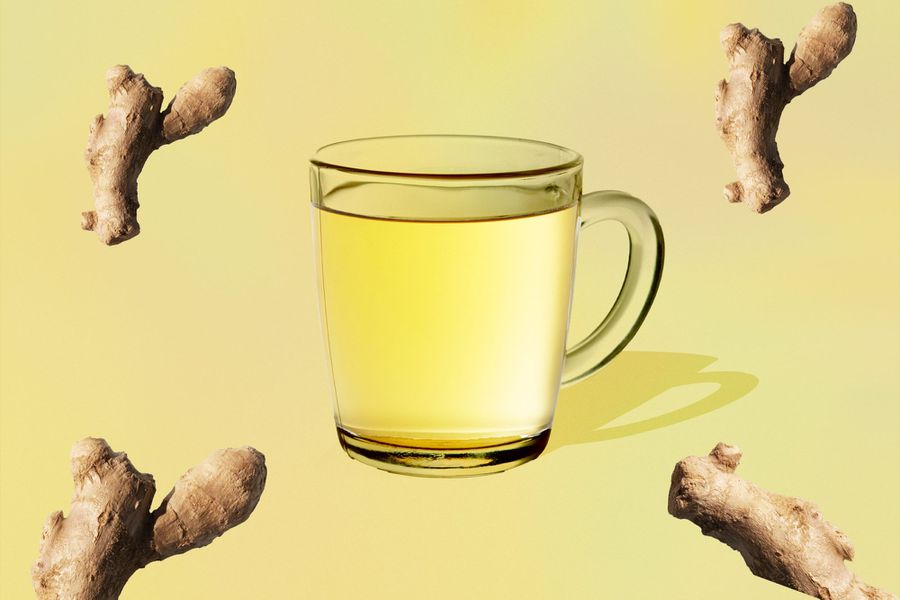We independently research, test, review, and recommend the best
products—learn more about
our process. If you buy something through our links, we may earn a commission.

If you're looking to spice up your drink game, it might be time to try ginger tea. It's a bit sweet, somewhat peppery, and super nutritious. After all, the drink is teeming with good-for-you nutrients that support several areas of health, from brain function to blood pressure. Ahead, find all the answers to the question, "is ginger tea good for you?" — along with tasty ways to enjoy it at home.
Ginger isn’t a known allergen. However, consuming too much ginger or ginger tea can cause unpleasant side effects such as stomach upset, diarrhea, and heartburn, says Kujawski. In some cases, its spicy flavor can also irritate the throat and mouth, according to the National Institutes of Health. “Individuals should avoid consuming ginger tea at doses in excess of 5 grams per day, which equates to four to five tea bags since one tea contains one or more grams of ginger,” says Kujawski.
How to Use Ginger Tea
If you’d like to try ginger tea, you’ve got several options. One method is to use dried ginger, which you can find at your local tea shop or supermarket — just be sure to opt for products without any additives and check the expiration date to make sure you’re brewing the freshest tea possible, says Kujawski. Dried ginger is available as a loose-leaf tea — e.g. Rishi Tea Ginger Loose Leaf Herbal Tea (Buy It, $30, amazon.com) — or tea bags — e.g. Yogi Tea Organic Ginger Tea Bags (Buy It, $24, amazon.com). You can also find dried ginger in tea blends, such as Teabloom Pineapple Ginger Organic Green Loose Leaf Tea (Buy It, $13, amazon.com), which includes a combo of dried ginger, green tea leaves, pineapple, and marigold flowers. Such blends often combine ingredients with complementary flavors, making them a delicious alternative to straight ginger tea. In either case, dried ginger is meant to be steeped in hot water, just like you would with other types of tea bags or loose-leaf tea.
Alternatively, you can make ginger tea from scratch using fresh ginger, according to Kujawski, who recommends choosing a “ginger root that appears firm, smooth, and shiny,” she says. You can usually find ginger in the produce aisle next to the onions, garlic, etc. At home, wash the ginger and remove any dirt and debris. Feel free to peel the ginger first, if you’d like — but that step’s not necessary, according to the University of Minnesota Extension. Next, slice the ginger into a small chunk (about 1-inch wide), says Kujawski. From there, steep the chunk in one cup of hot water, or simmer the ginger in the water in a pan over medium heat. The tea will be ready in about five minutes, but you can let the ginger steep or simmer longer for a stronger and spicier drink.
Ginger tea — whether made with dried or fresh ginger — can be enjoyed as is. But if you're looking to switch up your next cup o' tea, try these ideas:
Drink it cold. If iced tea is more your style, you can turn ginger tea into a cold concoction. Simply let the tea cool, then add ice cubes. You can even freeze extra ginger tea in an ice cube tray, then use the cubes to chill your next cup instead of regular ice cubes that can water down your beverage.
Add lemon juice. It’s no secret that lemon juice pairs well with tea, and ginger infusions are no exception. To take advantage of lemon ginger tea benefits, try adding a spritz or two of fresh lemon juice to hot or cold ginger tea. Craving more lemony goodness? Make this ginger lemonade recipe by food blog Ministry of Curry.
Mix in sweetener. For even more flavor, consider adding a sweetener (think: maple syrup or honey) to ginger tea. Try this recipe for ginger and honey iced tea from Real Simple for a refreshingly sweet and spicy beverage.



































